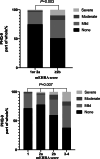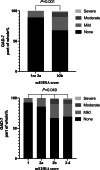Association between atrial fibrillation-related symptoms scored by modified European Heart Rhythm Association (mEHRA) and anxious and depressive status
- PMID: 40696599
- PMCID: PMC12282741
- DOI: 10.1097/MD.0000000000043511
Association between atrial fibrillation-related symptoms scored by modified European Heart Rhythm Association (mEHRA) and anxious and depressive status
Abstract
The key drivers of symptom severity in atrial fibrillation (AF) patients remain unclear. The study aimed to explore associations between anxious and depressive status and AF-related symptoms as expressed by the modified European Heart Rhythm Association (mEHRA) score. The study enrolled 182 AF patients admitted to the Cardiology Department of Peking University Third Hospital between February 2017 to January 2020. Anxious and depressive status were assessed by "Generalized Anxiety Disorder-7" and "Patient Health Questionnaire-9," respectively. The severity of AF-related symptoms was scored by mEHRA and classified into 2 groups: low mEHRA group (mEHRA = 1 or 2a) and high mEHRA group (mEHRA ≥ 2b), according to whether they were troubled or affected by AF-related symptoms. In all 182 AF patients, 56.0% (n = 102) patients presented mEHRA ≥ 2b. The high mEHRA group had significantly higher Patient Health Questionnaire-9 score [4.0 (2.0-7.0) vs 2.5 (0-4.8), P < .001] and Generalized Anxiety Disorder-7 score [3 (0-5) vs 0 (0-3), P < .001]. After adjusted for other covariates, persistent AF (odds ratio, OR = 0.48, 95% confidence interval [CI]: 0.23, 0.99), heart failure (OR = 2.91, 95% CI: 1.08, 8.43), depressive status (OR = 2.15, 95% CI: 1.01, 4.65), and anxious status (OR = 2.83, 95% CI: 1.17, 7.38) were independently associated with high mEHRA score (≥2b). Increased anxiety and depression levels was associated with feeling troubled or limited by AF-related symptoms scored by mEHRA.
Keywords: anxiety; atrial fibrillation; depression; modified European Heart Rhythm Association score; symptom.
Copyright © 2025 the Author(s). Published by Wolters Kluwer Health, Inc.
Conflict of interest statement
The authors have no conflicts of interest to disclose.
Figures


Similar articles
-
Intravenous magnesium sulphate and sotalol for prevention of atrial fibrillation after coronary artery bypass surgery: a systematic review and economic evaluation.Health Technol Assess. 2008 Jun;12(28):iii-iv, ix-95. doi: 10.3310/hta12280. Health Technol Assess. 2008. PMID: 18547499
-
Mediating effect of coping strategy and psychological status between illness perception and quality of life among patients with atrial fibrillation: a cross-sectional study.BMC Cardiovasc Disord. 2024 Sep 19;24(1):504. doi: 10.1186/s12872-024-04176-4. BMC Cardiovasc Disord. 2024. PMID: 39300328 Free PMC article.
-
Exercise-based cardiac rehabilitation for adults with atrial fibrillation.Cochrane Database Syst Rev. 2024 Sep 17;9(9):CD011197. doi: 10.1002/14651858.CD011197.pub3. Cochrane Database Syst Rev. 2024. PMID: 39287086
-
High prevalence of moderate and severe depressive and anxiety symptoms in polycystic ovary syndrome: a systematic review and meta-analysis.Hum Reprod. 2017 May 1;32(5):1075-1091. doi: 10.1093/humrep/dex044. Hum Reprod. 2017. PMID: 28333286
-
External electrical and pharmacological cardioversion for atrial fibrillation, atrial flutter or atrial tachycardias: a network meta-analysis.Cochrane Database Syst Rev. 2024 Jun 3;6(6):CD013255. doi: 10.1002/14651858.CD013255.pub2. Cochrane Database Syst Rev. 2024. PMID: 38828867 Free PMC article.
References
-
- Zulkifly H, Lip GYH, Lane DA. Epidemiology of atrial fibrillation. Int J Clin Pract. 2018;72:e13070. - PubMed
-
- Kirchhof P, Benussi S, Kotecha D, et al. 2016 ESC guidelines for the management of atrial fibrillation developed in collaboration with EACTS. Eur Heart J. 2016;37:2893–962. - PubMed
-
- Patel N, Chung EH, Mounsey JP, Schwartz JD, Pursell I, Gehi AK. Effectiveness of atrial fibrillation monitor characteristics to predict severity of symptoms of atrial fibrillation. Am J Cardiol. 2014;113:1674–8. - PubMed
-
- Walters TE, Wick K, Tan G, et al. Symptom severity and quality of life in patients with atrial fibrillation: psychological function outweighs clinical predictors. Int J Cardiol. 2019;279:84–9. - PubMed
Publication types
MeSH terms
LinkOut - more resources
Full Text Sources
Medical

